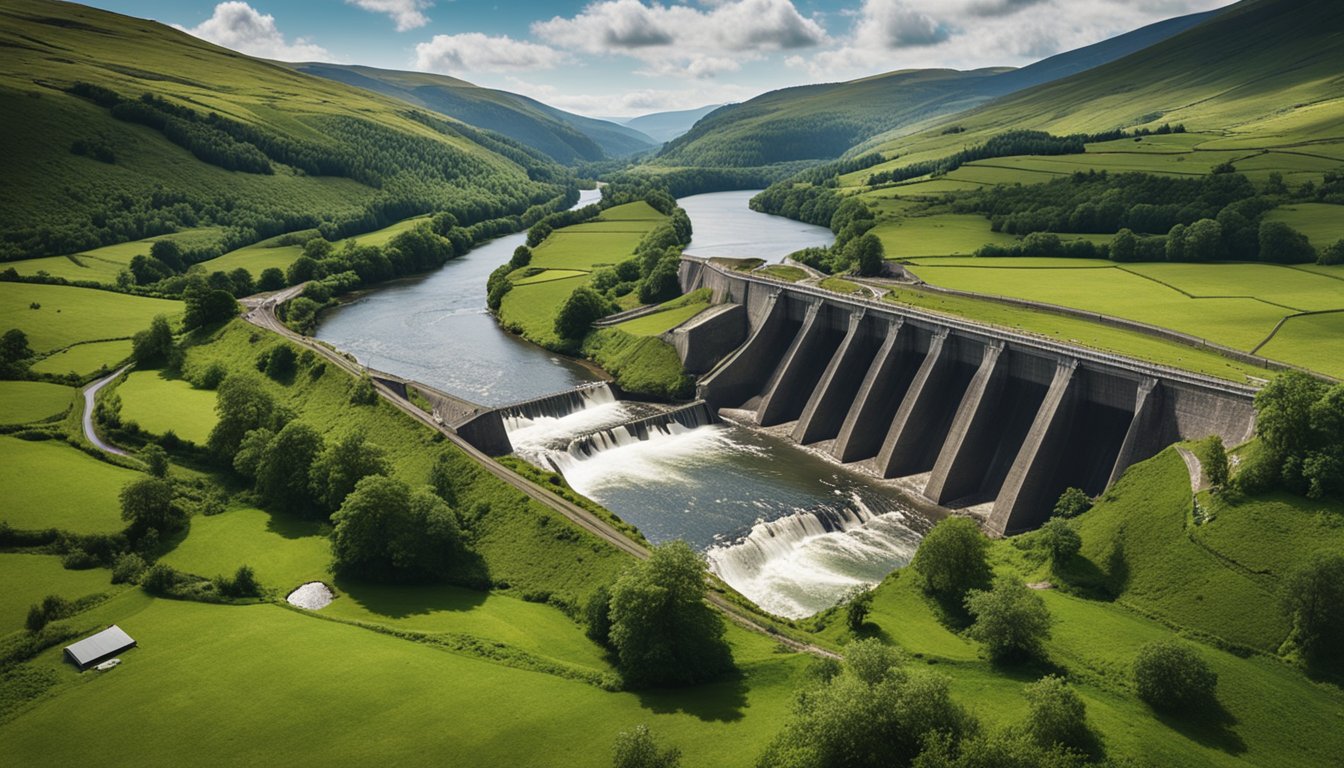Late updated: 23 Oct 2024 14:10
Written by: Oliver Bennett
Hydroelectric Solutions For Remote UK Communities: Advancing Sustainable Energy Access
In the heart of the United Kingdom's picturesque landscapes, there lies a potential for sustainable transformation. Remote communities across the UK face unique challenges in securing reliable electricity. Traditional power grids often struggle to reach these isolated areas, posing a significant barrier to modern living standards and development. Hydroelectric solutions provide a sustainable and reliable way to electrify these rural communities, harnessing local water resources to generate clean energy. This innovative approach not only meets practical needs but also aligns with the broader goals of renewable energy adoption.

Our exploration delves into the potential of small and micro hydropower facilities. By tapping into local streams and rivers, these systems offer an apt solution for areas with suitable hydrological features. The engagement of local communities plays a crucial role in the success of such projects, ensuring that the solutions are tailored to meet specific local demands and harness community involvement for sustained operation.
The beauty of hydroelectric solutions lies in their adaptability. They integrate seamlessly with other renewable energy sources and can operate independently or in conjunction with existing grids. By focusing on community needs and environmental considerations, we aim to pave the way for a greener, more self-reliant future for remote UK communities.
Key Takeaways
- Hydroelectric power offers reliable energy for remote UK communities.
- Community involvement enhances the effectiveness of small-scale projects.
- Hydropower integrates well with existing renewable solutions.
Understanding Hydroelectric Power in Remote Communities

In remote UK communities, hydroelectric power presents a promising solution to energy access barriers. This section will explore how these systems tackle electrification challenges, offer sustainable benefits, and involve significant environmental and social considerations.
Scope of Electrification Challenges for Remote Villages
Remote villages often face daunting obstacles in accessing reliable electricity. Geographic isolation increases infrastructure costs, making grid extension economically unviable. Consequently, many communities remain disconnected from national energy networks. Hydroelectric power can serve as an independent, localised electricity source for these regions. By using local water resources, it reduces dependency on external power sources and helps bridge the energy gap.
Rural electrification through small-scale hydro systems enables communities to achieve energy independence. There's potential for more consistent electricity generation compared to other renewables like solar and wind, which are affected by weather variations. Such systems, when effectively implemented, can contribute significantly to the UK's sustainability targets and energy accessibility mandates.
Benefits of Hydroelectric Power for Sustainability and Energy Justice
Hydroelectric power is a clean energy source that aids the shift towards sustainable development. It reduces carbon footprints by minimising reliance on fossil fuels. These systems ensure energy justice by facilitating equal access to electricity in underserved regions. Integrating hydro power in rural settings promotes economic growth and improves quality of life through provision of stable and affordable electricity.
Communities benefit from hydroelectric systems as they empower local governance over energy resources. By enabling self-sufficiency in energy production, residents can improve their living standards and reduce overall energy costs. This green electricity source provides a reliable and sustainable alternative, aligning with global climate commitments and local environmental health objectives.
Environmental and Social Organisation Considerations
Developing hydroelectric systems in remote areas necessitates careful evaluation of environmental impacts and social organisation. While these projects offer significant emissions reductions, they must be designed to minimise ecological disruption. We must consider river ecosystems and the biodiversity reliant on them. Therefore, thorough environmental impact assessments are crucial before initiating projects.
Community involvement is vital for project success. Engaging local populations in planning and execution can help mitigate potential conflicts over resource allocation. Moreover, fostering partnerships between local stakeholders and government bodies enhances the project's acceptance and sustainability. Harnessing hydroelectric potential in a socially and environmentally conscious manner ensures these renewable projects support both ecological preservation and community empowerment.
Developing Hydroelectric Solutions

Our focus on developing hydroelectric solutions in remote UK communities involves several critical components. These include the design and deployment of micro-hydro schemes, exploring diverse ownership models and funding opportunities, and integrating with existing hybrid energy systems to maximise efficiency and sustainability.
Design and Deployment of Micro-Hydro Schemes
Micro-hydro schemes offer significant potential for energy generation in rural areas. They utilise the natural flow of water to produce electricity with minimal environmental impact. The design process involves selecting suitable sites with consistent water flow and minimal ecological disturbance.
These schemes usually include the installation of small turbines and generators. The proximity of micro-hydro power setups to remote villages aids in reducing transmission losses. Careful planning ensures that the projects remain sustainable and effective for long-term energy production. Additionally, local community involvement is crucial for site selection and project management.
Ownership Models and Funding for Rural Development
Funding and ownership models heavily influence the success of hydroelectric projects. Community ownership can foster local engagement and ensure that benefits remain local. This model often includes cooperative structures where profits are reinvested into the community.
Government grants and private investments are vital for initial capital costs, allowing projects to overcome significant financial barriers. Developing partnerships with national energy bodies can also provide technical expertise and additional funding avenues. Creating diverse funding portfolios improves project resilience and supports broader rural development initiatives.
Integrating with Existing and Hybrid Energy Systems
To enhance reliability, micro-hydro systems can be integrated with other renewable energy sources. This creates hybrid energy systems that balance supply and demand effectively. Hybrid systems may include solar panels or wind turbines combined with diesel generators for back-up.
Incorporating microgrids enhances energy efficiency and stabilises local supply. Energy storage solutions, such as batteries, help manage variable energy production. We aim to develop systems that ensure accessibility and resilience, essential in remote and off-grid locations. Understanding the local energy landscape enables us to tailor solutions that meet specific needs and conditions.
Frequently Asked Questions

Exploring hydroelectric solutions in remote UK communities involves understanding implementation methods, economic impacts, and specific challenges. Additionally, comparing tidal power and other eco-friendly alternatives offers a broader perspective on sustainable energy choices for off-grid areas.
How can hydropower be implemented in remote UK communities?
Hydropower in these areas often involves small-scale projects, known as micro or pico hydropower installations, which use local water flows to generate electricity. These setups are tailored to the geographical and ecological characteristics of rural locations in Scotland and Wales. Community engagement is crucial to ensure the success and sustainability of these projects.
What are the economic implications of establishing hydropower in rural UK areas?
Initial installation costs can be significant. However, hydropower offers long-term savings by reducing dependency on non-renewable energy sources. Over time, decreased energy costs can benefit local economies. Successful implementation often leads to job creation and increased investment in community infrastructure.
What challenges face the installation of hydroelectric generators in isolated British locations?
Logistical challenges, including difficult terrain and limited existing infrastructure, can impede installation. Furthermore, securing funding and navigating regulatory requirements present additional hurdles. It's essential to assess environmental impacts carefully to minimise ecological disruptions.
How does tidal power serve as an alternative for remote communities in the UK?
Tidal power leverages the UK's extensive coastline, using the predictable nature of tides to generate electricity. This consistency offers a reliable energy source. While tidal projects require significant upfront investment, they provide a sustainable alternative to traditional hydropower in areas with strong tidal currents.
What are the primary limitations of hydropower for UK residents living off-grid?
Hydropower availability is highly dependent on local water resources, which can fluctuate seasonally. Climate variations and competition for water use may limit effectiveness. Additionally, the environmental impact on river ecosystems can pose significant challenges.
What eco-friendly energy solutions are available aside from traditional hydroelectric systems for UK villages?
Beyond traditional hydropower, solar and wind energy solutions offer renewables options for off-grid communities. The adaptability of solar panels and wind turbines makes them feasible for diverse locations. Advances in battery storage technology enable more effective harnessing and storage of these energy sources, complementing other renewable efforts.
